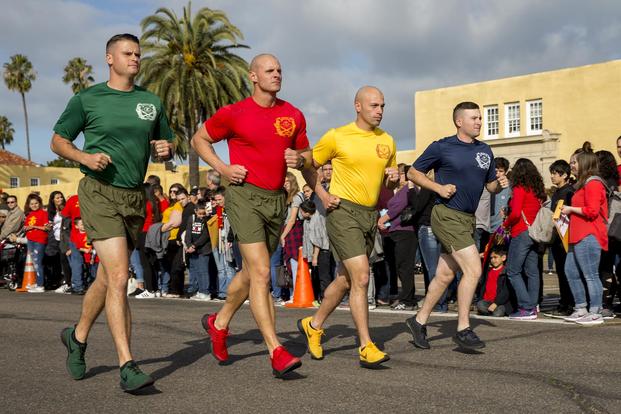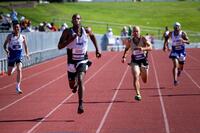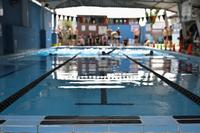If you are considering military service, you should research which military job you'd like to be in, then prepare to qualify for it.
Your preparation may require physical training to get in shape or lose weight. At the same time, you may need to finish school, study specifically for the Armed Services Vocational Aptitude Battery (ASVAB) or acquire other physical or scholastic skills.
This timeline depends on your athletic history, academic training, medical screening and the specific challenges of your job, known as a military occupational specialty in the Army and Marine Corps; a rating in the Navy and Coast Guard; and an Air Force specialty code.
Most recruits are thoroughly underprepared for the challenges in basic and advanced training, especially when it comes to physical standards. A few months of preparation will help a majority of them work through long training days, warding off failure and overtraining injuries like running overuse injuries or the more serious rhabdomyolysis.
If you select a job that is not very physically demanding, your athletic history and current training routine likely will prepare you for the rigors of your basic training, as long as you run and do calisthenics in preparation. Depending on your fitness level and scores, this may require only two or three months of training. If you are just starting out with fitness, it may require 6-12 months to get yourself to a level of fitness that meets military standards.
You may meet the standards of the PT test, but if you are not capable of long days of physical work, you may experience injuries along the way. Overuse injuries could delay or end your military experience at basic training or boot camp.
The job you want in the military will depend on your physical scores and your ASVAB scores, so know what you are getting into both physically and academically:
- Army ASVAB and Jobs. Not only do the branches require a minimum score to qualify for certain jobs, the Army has instituted a physical version of the ASVAB called the OPAT -- occupational physical assessment test.
The Army PT test has changed, too, and is now the Army combat fitness test. Practice these new fitness testing elements before you enter the service. Any advancement into programs like Army Rangers or Army Special Forces will require much higher physical fitness standards.
- Air Force ASVAB and Jobs. Regular Air Force fitness is not too challenging but still requires some effort on your part to obtain passing scores.
The academic standards are typically higher. Because it's highly technical and mechanical, the Air Force will require a higher score on the technical and science aptitude portions of the ASVAB.
Naturally, any job in the Air Force Special Warfare units will require an above-average fitness standard and grueling training process.
- Navy ASVAB and Jobs. Regular Navy fitness standards are not that difficult for the average person who exercises regularly. The Navy no longer does crunches and has replaced the exercise with the plank pose. Practicing push-ups and plank poses together in a workout mixed with running is a good start.
There are many technical jobs in the Navy that require higher ASVAB scores, but there are many non-technical jobs that you could qualify for if you do not take your preparation seriously.
Navy Special Warfare and Special Ops (SEAL, SWCC, EOD, diver) require higher levels of fitness and swimming proficiency. You should prepare for these standards long before you visit the recruiter's office. Are you ready to serve?
- Marine Corps ASVAB and Jobs. Marine Corps boot camp will be tough, no matter what your job. Pull-ups or push-ups, sit-ups or planks, and a three-mile timed run make its PT test one of the hardest in the military.
Add infantry, RECON and MARSOC to your plans, and your preparation should be much more involved with running, rucking and swimming. Your job in the Marines also will depend on your ASVAB score, but be ready for the physical challenges as well.
- Coast Guard ASVAB and Jobs. The Coast Guard requires the ASVAB, along with swimming and fitness standards similar to the Navy. From boatswain mates to avionic technicians, the technology of your training also will depend on your ASVAB scores and career goals.
You will get more out of your career in the military if you research the jobs that interest you, learn where you will train and for how long, learn where you likely will live and how programs like the GI Bill works for veterans.
Considering your future path is serious. Do not leave it up to the needs of the service and recruiters to find a job for you. Take their advice and prepare for what interests you the most.
Stew Smith is a former Navy SEAL and fitness author certified as a Strength and Conditioning Specialist (CSCS) with the National Strength and Conditioning Association. Visit his Fitness eBook store if you’re looking to start a workout program to create a healthy lifestyle. Send your fitness questions to stew@stewsmith.com.
Want to Learn More About Military Life?
Whether you're thinking of joining the military, looking for fitness and basic training tips, or keeping up with military life and benefits, Military.com has you covered. Subscribe to Military.com to have military news, updates and resources delivered directly to your inbox.
















